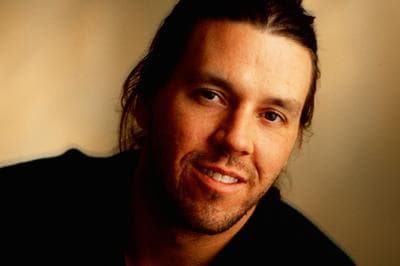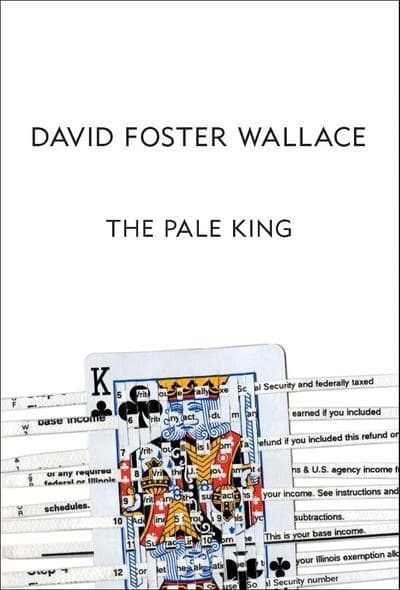Advertisement
David Foster Wallace's Heroic IRS
Resume
The late author David Foster Wallace wrote about a fictional version of the IRS in his posthumous, unfinished novel, "The Pale King" (see excerpt below).
Wallace sets his novel in a dramatized version of the 1980s, at an IRS processing center in Peoria, Ill.
Marshall Boswell, who teaches English at Rhodes College and studies Wallace’s work, said that Wallace uses the aftermath of the Reagan revolution and the economic policies of trickle down, to locate “year zero for our current political stalemate.”
IRS Becomes The Bad Guy
In Wallace’s dramatization, the tax cuts that Reagan instated on the top marginal rate were supposed to encourage economic growth.
"Wallace was keenly aware of the size of his audience, and the intensity with which people identified with him."
Prof. Marshall Boswell
However, they resulted in a revenue loss, which, combined with an increase in defense spending, left the Reagan administration with a big budget deficit on its hands.
The IRS becomes the agency tasked with filling this revenue gap. It does this by aggressively auditing taxpayers.
“In Wallace’s vision, the IRS transitions from being a place associated with social justice and civic virtue — where you contribute to the greater good — and it becomes this sort of enemy of the normal taxpayer and also a kind of for-profit business, where the maximum yield is what the agents are now being charged with pursuing,” Boswell said.
Religious Duty To Pay Taxes
However, within the IRS, Wallace sees some of the agents as heroic, and the act of paying taxes almost like a religious duty. One of the characters in the novel, Chris Fogle, becomes an IRS accountant after a "religious" experience.
He stumbles into an accounting class taught by a Jesuit priest, who tells the class: "You are called to account." Fogle feels these words are directed at him, and he gives up his rootlessness and finds his purpose.
“He has a religious conversion and he becomes a tax accountant, he becomes an IRS agent,” Boswell said. “That transformation is, I think, Wallace’s pretty serious attempt to explore a notion of religious experience as real. How do we engage with the civic world; we treat paying taxes like it’s a religious duty.”
Ultimately, Wallace uses the transformation of the IRS and the act of paying taxes to make an argument about civic engagement and citizens’ responsibilities to one another.
“There’s a serious appeal to people of his generation, particularly, to give up the cynicism ... because that’s the governing attitude toward Washington right now, and it’s a well-earned attitude,” Boswell said.
Premature Death
Wallace committed suicide in September 2008. He had struggled with depression, and he was a recovering alcoholic. He had been working on "The Pale King" for over a decade.
Despite its unfinished state, Boswell thinks "The Pale King" is a powerful book, and Wallace wanted to do some good with it.
“Wallace was keenly aware of the size of his audience, and the intensity with which people identified with him,” Boswell said. “I think he was trying to harness that power and do something bigger with it.”
A 2005 commencement speech by David Foster Wallace, put to video:
____Book Excerpt: 'The Pale King'
By: David Foster Wallace____
Chapter 1

Past the flannel plains and blacktop graphs and skylines of canted rust, and past the tobacco-brown river overhung with weeping trees and coins of sunlight through them on the water downriver, to the place beyond the windbreak, where untilled fields simmer shrilly in the a.m. heat: shattercane, lamb’s‑quarter, cutgrass, sawbrier, nutgrass, jimsonweed, wild mint, dandelion, foxtail, muscadine, spinecabbage, goldenrod, creeping charlie, butter-print, nightshade, ragweed, wild oat, vetch, butcher grass, invaginate volunteer beans, all heads gently nodding in a morning breeze like a mother’s soft hand on your cheek. An arrow of starlings fired from the windbreak’s thatch. The glitter of dew that stays where it is and steams all day. A sunflower, four more, one bowed, and horses in the distance standing rigid and still as toys. All nodding. Electric sounds of insects at their business. Ale-colored sunshine and pale sky and whorls of cirrus so high they cast no shadow. Insects all business all the time. Quartz and chert and schist and chondrite iron scabs in granite. Very old land. Look around you. The horizon trembling, shapeless. We are all of us brothers.
Some crows come overhead then, three or four, not a murder, on the wing, silent with intent, corn-bound for the pasture’s wire beyond which one horse smells at the other’s behind, the lead horse’s tail obligingly lifted. Your shoes’ brand incised in the dew. An alfalfa breeze. Socks’ burrs. Dry scratching inside a culvert. Rusted wire and tilted posts more a symbol of restraint than a fence per se. NO HUNTING. The shush of the interstate off past the windbreak. The pasture’s crows standing at angles, turning up patties to get at the worms underneath, the shapes of the worms incised in the overturned dung and baked by the sun all day until hardened, there to stay, tiny vacant lines in rows and inset curls that do not close because head never quite touches tail. Read these.
Excerpted from the book THE PALE KING by David Foster Wallace. Copyright © 2011 by David Foster Wallace Literary Trust. Reprinted with permission of Little, Brown and Company.
Guest:
- Marshall Boswell, professor at Rhodes College in Tennessee.
This segment aired on May 29, 2013.
